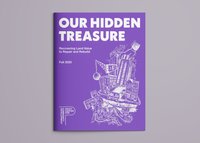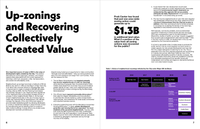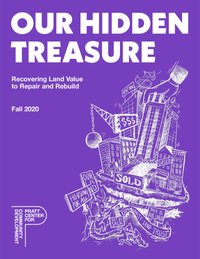In “Our Hidden Treasure: Recovering Land Value to Repair and Rebuild,” Pratt Center draws lessons from Mayor de Blasio’s zoning proposals and presents an in-depth case study of land values in Gowanus to illuminate the ways that land use practice in the city lets value slip away, undermining efforts to create a more equitable city.

Building on Public Action, Public Value, the report details what is lost by untempered speculation, ill-considered zoning changes divorced from planning, and privatization of public land. It explores the value created by City up-zonings and the value of land the City owns, or could come to own at a time when New York City faces fiscally difficult years ahead. The provocative ideas within can provide the basis for discussion and debate for how best to recover land value to advance racial and economic justice.
Background
As COVID-19 continues to devastate families and communities across NYC, and the city’s fault lines of racial and economic inequality continue to be exposed, our choices about what we value will fundamentally shape the future of the city.
This report is based on three good governance propositions:
The City should discourage front-running. It is problematic when the public sector creates value that becomes a private windfall.
The City should have a coherent value recovery strategy. When the public sector creates value, it should recover a portion of that value.
The public sector should reinvest reclaimed value in redistributive and reparative ways.

Recommendations
The report recommends serious discussion among elected officials and leaders of executive agencies of three broad proposals:
Restructure taxation at the time of property transfer in order to capture value uplift that would otherwise go to “front-runners” and speculators.
Create Transfer of Development Rights districts or Purchasable Density Bonus regimes that require property developers to purchase the option to densify rather than granting it free of charge via up-zonings.
Establish social ownership/social stewardship mechanisms that enable land to be transferred to mission-driven organizations devoted to housing justice and economic security.
